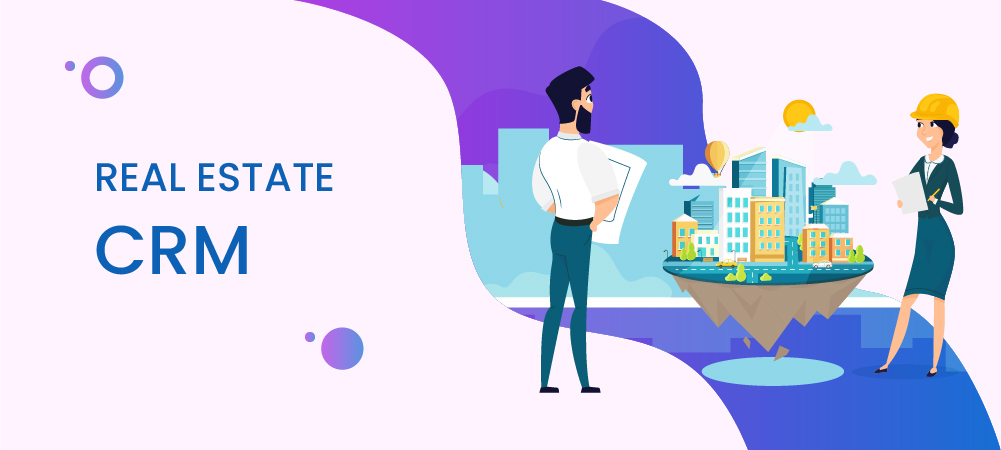CRM Evolution in Real Estate and Future Trends
In the dynamic realm of real estate, where the foundation of success rests upon building and nurturing relationships, the evolution of Customer Relationship Management (CRM) systems has been nothing short of remarkable. The infusion of CRM in real estate has not only streamlined the operations within this industry but has also redefined the way professionals operate. In this blog, we embark on a journey through the history of CRM in real estate, delve into its current state, and peer into the crystal ball to discern the future trends.
The Past: CRM in Real Estate
Not too long ago, real estate professionals heavily relied on rudimentary tools such as spreadsheets, paper records, and their own memory to manage client information and interactions. This antiquated approach posed challenges in maintaining accurate data and delivering seamless customer experiences. The need for a more sophisticated solution became evident.
This is where CRM systems made their entrance into the world of real estate. Initially, these systems served as basic databases for storing client information, property details, and transaction histories. While a significant step forward, these early CRM systems lacked the advanced functionalities that modern real estate professionals demanded.
The Present: CRM in Real Estate
In the contemporary real estate landscape, CRM (Customer Relationship Management) systems have undergone a profound transformation, emerging as indispensable tools that empower agents, brokers, and property managers to revolutionize their operations and cultivate stronger customer relationships. The following outlines how CRM is currently reshaping the industry:
- Centralized Data Management: Modern CRM systems act as centralized hubs for storing and managing vital data, encompassing client information, property listings, and communication histories. This centralized approach ensures that every member of the real estate team operates from the same informational foundation, ultimately reducing errors and fostering heightened collaboration.
- Automation and Workflow: CRM systems in real estate have evolved to include automation features that take charge of routine tasks, such as scheduling follow-up emails, setting appointments, and nurturing leads. By automating these processes, real estate professionals can liberate valuable time to focus on core tasks, including building and nurturing client relationships and closing deals.
- Lead Tracking and Nurturing: CRM systems facilitate meticulous tracking of leads, monitoring their activities, preferences, and behaviors. This invaluable data enables agents to provide personalized service, thereby enhancing the probability of successful transactions. Agents can fine-tune their approach based on the specific needs and preferences of each client, creating a more gratifying experience for both buyers and sellers.
- Data Analytics: The integration of real-time data analytics within CRM platforms offers real estate professionals insights into market trends and dynamics. This data-driven approach enables informed decision-making across various facets of the business, ranging from pricing strategies to property recommendations. In a competitive industry like real estate, these analytics prove invaluable for staying ahead of the curve.
- Mobile Accessibility: Today’s CRM systems prioritize mobility, often providing mobile applications that allow agents to access critical information while on the move. Whether in the office or out in the field, real estate professionals can stay seamlessly connected with clients, respond to inquiries promptly, and access essential data conveniently through their mobile devices.
- Integration with Other Tools: Modern CRM systems recognize the importance of interoperability. They seamlessly integrate with various real estate tools and platforms, including property listing websites, email marketing services, and even virtual reality property tours. This integration streamlines processes, enriches the overall client experience, and keeps real estate professionals competitive in a tech-savvy market.

The Future: Trends in CRM for Real Estate
As technology continues its relentless advance, the realm of Customer Relationship Management (CRM) in real estate stands on the brink of a profound transformation. Here, we venture into the future of CRM in real estate, exploring the trends and innovations that are poised to redefine the industry:
- AI and Machine Learning: The fusion of artificial intelligence (AI) and machine learning is primed to revolutionize CRM systems within the real estate sector. These technologies will empower CRM systems to offer predictive analytics, aiding real estate professionals in anticipating market trends and customer preferences. AI-driven chatbots will excel at handling customer inquiries with remarkable efficiency, delivering immediate responses and liberating human agents to focus on more intricate tasks. Moreover, AI will offer data-driven recommendations for property investments, enabling agents to make well-informed decisions grounded in historical data and market analysis.
- Blockchain for Transactions: Blockchain technology looms on the horizon as a transformative force in real estate transactions. CRM systems will play a pivotal role in facilitating and transparently recording these transactions. The decentralized ledger inherent to blockchain will ensure the integrity of property records, rendering them tamper-proof and effortlessly accessible. This innovation promises not only to streamline the buying and selling process but also to significantly diminish the risk of fraud and disputes, instilling a heightened sense of trust in the real estate market.
- Virtual Reality Property Tours: Picture a scenario where you can tour a property from the comfort of your own home. This is the future that CRM platforms are ushering in as they integrate virtual reality (VR) technology. Virtual reality property tours will provide prospective buyers with a fully immersive experience, enabling them to explore properties as if they were physically present. This innovation will economize time for both buyers and agents by narrowing down choices before in-person visits, rendering the house-hunting process more efficient and enjoyable.
- Voice Assistants: Voice-activated CRM systems are primed to become indispensable tools for real estate agents. These systems will enable agents to access critical information and manage tasks through simple voice commands. Whether it involves retrieving property details, scheduling appointments, or dispatching follow-up emails, voice assistants will augment agent productivity and responsiveness. This hands-free approach will prove especially advantageous during property viewings, where agents can swiftly access property information without being tethered to a device.
- Personalization: Personalization stands as the keystone of future customer interactions, and CRM systems within real estate are poised to lead the charge. These systems will become even more adept at tailoring interactions to individual clients. Whether it entails furnishing clients with curated property recommendations based on their preferences and past interactions or delivering highly personalized marketing campaigns, CRM systems will enable agents to forge stronger and more meaningful relationships with their clients. Such a degree of personalization will not only amplify customer satisfaction but also augment the likelihood of successful transactions.
- Smart Home Integration: As smart homes gain ascendancy, CRM systems will incorporate seamless integration with smart devices as a standard feature. Real estate professionals will be well-equipped to demonstrate the advantages of smart living to potential buyers. This might encompass showcasing how a property’s smart lighting, security, heating, and entertainment systems can heighten convenience, bolster security, and enhance energy efficiency. By infusing smart home technology into their CRM systems, agents will cater to the burgeoning demand for connected and technologically advanced residences.
Conclusion
CRM in real estate has traversed a considerable distance from its modest beginnings. Today, it stands as a formidable tool that begets efficiency, enriches customer relationships, and fosters overarching success in the industry. As we cast our gaze towards the horizon, the integration of AI, blockchain, virtual reality, and sundry other emerging technologies promises to mold the real estate landscape into something even more remarkable. Those real estate professionals who embrace these trends and ride the technological wave will find themselves optimally positioned to flourish in a realm that is ceaselessly evolving. CRM in real estate isn’t merely a tool; it is the harbinger of the industry’s future. We invite you to stay tuned for further developments in the captivating world of CRM and real estate.
